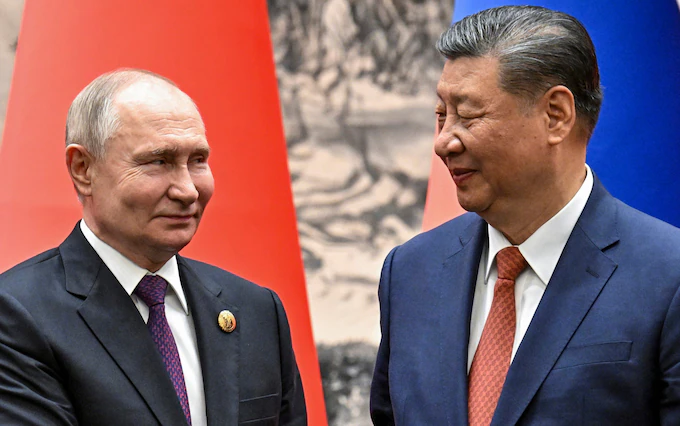“Still nosebleed long,” grunted Bulldog, selling a few S&P puts for sport. “Bought more stocks, and now I’m buying bonds. Not as a hedge, they’re both going up,” growled Dawg. “The Baby Boomers are still too nervous about this market, Gaza, Russia, China, Iran. They got trillions sitting in money market funds. But at some point, as stocks rally, these Boomers are going to get FOMO.” That’s when the last leg higher takes off. “It’ll be parabolic. The talking heads will go nuts. VIX will hit 10.” And Dawg dropped to the ground with a thud, as if all four legs lost power simultaneously, due to some malfunction. “But after the blow off top, this market will crash, bigger than anything we’ve seen. Gold is telling you what’s coming.”
Overall: “Over the past few weeks, Ukraine came to us and asked for the authorization to use weapons that were provided to defend against the aggression near Kharkiv,” said Anthony Blinken, “including against Russian forces that are massing on the Russian side of the border.” Rumors circulated that Biden had approved the use of US weapons for strikes inside Russia’s border. The Secretary of State felt it time to confirm that fact. When asked if the door was open for the US to allow Ukraine to strike further into Russia, Blinken said the US would continue to “adapt and adjust” moving forward. Markets were profoundly quiet. The Memorial Day holiday seemed to mark the start of summer trading. For a couple years our central bankers, economists, strategists, and forward markets have gotten just about everything wildly wrong. Inflation, interest rates, real rates, housing, employment, regional banking, GDP, budget deficits, you name it. But lately, surprises seem to have returned to the pedestrian variety of ten basis points here or there. And with trillions sitting in money market funds, and equity market sentiment neither overwhelmingly bullish nor bearish, the swings in price are kind of boring. “What we are in now is a production war,” said a senior NATO official. “The outcome in Ukraine depends on how each side is equipped to conduct this war.” Russia is producing 3x the number of artillery shells as Nato allies and at just 25% of the cost. And Nato has just 5% of the air defenses it needs on its eastern flank. That is sure to soon change. It’s all heating up in the Pacific too. Lieutenant General Jing Jianfeng denounced the US as the “source of chaos and tension” in the Indo-Pacific and said its regional strategy aimed to “create division, provoke confrontation and undermine stability”. He accused the US of seeking an Asia-Pacific Nato. Probably true. But markets don’t care until they care, because of course, traders have no real idea how to trade geopolitical risk.
Week-in-Review: Mon: US holiday = quiet markets, Egyptian border guard killed during a clash with Israeli troops, Israel mistakenly targets refugee camp in airstrike near Rafah, BOJ gov Ueda optimistic on CPI exp continuing to rise, Israel CB unch as exp, Germany IFO 89.3 (90.4e), S&P closed; Tue: Riksbank’s Theeden says the bar to cut in June is very high, Israeli tanks reach center of Rafah, pro-Chinese Taiwan legislators pass law to increase oversight on presidential authority, Fed’s Kashkari says can’t rule out hikes while wage growth is still robust / Mester pushes for enhancing communication strategy, China’s biggest cities ease rules for downpayments and mortgages, ECB’s Villeroy says should exclude back to back cuts, Macron argues for a ‘buy European’ strategy to compete with US/China, US 2y & 5y auctions failed, Japan PPI services 2.8% (2.3%e), ECB’s 1y infl exp 2.9% as exp / 3y exp 2.4% (2.5%e), Brazil IPCA infl 3.7% (3.74%e), US C/S house prices 6.49% (6.6%e), US Cons conf 102.0 (96.0e), US Dallas fed mfg -19.4 (-12.1e), S&P flat; Wed: BOJ’s Adachi says monetary policy response is possible if JPY weakness persists, Israel says Hamas probably won’t be totally defeated for another 7m, Fed’s beige book pointed to modest growth and sticky inflation, US 7y auction tailed – 3rd failed auction in a row, S. Africa election day, Australia CPI 3.6% (3.4%e), Japan cons conf 36.2 (39.5e), Germany cons conf-20.9 (-22.5e), EU M3 1.3% as exp, Poland CPI 2.5% (2.8%e), Germany CPI 2.8% (2.7%e), Russia IP 3.9% (4.0%e), US Richmond Fed mfg 0 (-7e), S&P -0.7%; Thu: Trump found guilty of all 34 counts in Hush Money conviction, ANC underperforms in exit polls (~43%) causing increased odds of coalition govt, Fed’s Williams says ample evidence that policy is restrictive / Logan says policy may be less restrictive than thought, PBOC says a ‘powerful currency’ requires FX stability / vows to improve the CNH liquidity supply mechanism, US reportedly set to reign in amount of AI chips sent to Middle East, Musk to advise Trump on crypto policy, Israel’s opposition party submitted bill to dissolve parliament / force early elections to oust Bibi, Italy unemp 6.9% (7.3%e), EU unemp 6.4% (6.5%e), US 1Q GDP (2nd est) 1.3% as exp, US init claims 219k (217k e), S&P -0.6%; Fri: US PCE 2.7% as exp / Core 2.8% as exp, Japan’s MOF used ~62.2b USD to intervene in the currency, reports of ANC/DA coalition forming in S. Africa following ANC’s poor election results, ECB’s Panetta says several cuts would still leave policy in restrictive territory, Japan unemp 2.6% as exp / IP -1.0% (-1.1%e) / Ret sales 2.4% (1.7%e), Japan Tokyo CPI 2.2% as exp / Core 1.7% (1.8%e), China PMI mfg 49.5 (50.5e) / non-mfg 51.1 (51.5e), Japan Housing starts 13.9% (-0.1%e), Germany ret sales 1.8% (2.5%e), UK house prices 1.3% (0.9%e), S&P downgrades France credit rating, France CPI 2.7% (2.6%e) / 1Q GDP (final) 1.3% (1.1%e), Turkey 1Q GDP 5.7% (5.8%e), EU CPI 2.6% (2.5%e) / Core 2.9% (2.7%e), India 1Q GDP 7.8% (7%e), Canada 1Q GDP 1.7% (2.2%e), US Personal spending 0.2% MoM (0.3%e)/ income 0.3% as exp, US Chicago PMI 35.4 (41.6e), S&P +0.8%; Sat: Modi set for decisive majority in Indian election win.
Weekly Close: S&P 500 -0.5% and VIX +0.99 at +12.92. Nikkei -0.4%, Shanghai -0.1%, Euro Stoxx -0.5%, Bovespa -1.8%, MSCI World -1.2%, and MSCI Emerging -2.3%. USD rose +2.0% vs South Africa, +1.9% vs Mexico, +1.8% vs Chile, +1.6% vs Indonesia, +1.5% vs Brazil, +0.4% vs India, +0.2% vs Yen, +0.1% vs Russia, and +0.1% vs Turkey. USD fell -2.0% vs Ethereum, -1.3% vs Sweden, -0.4% vs Australia, -0.3% vs Canada, -0.1% vs Bitcoin, flat vs Sterling, flat vs China, and flat vs Euro. Gold -0.4%, Silver +0.2%, Oil -0.7%, Copper -2.6%, Iron Ore -3.1%, Corn -4.1%. 10yr Inflation Breakevens (EU +2bps at 2.10%, US +3bps at 2.36%, JP flat at 1.55%, and UK +4bps at 3.76%). 2yr Notes -7bps at 4.87% and 10yr Notes +3bps at 4.50%.
May Mthly Close: S&P 500 +4.8% and VIX -2.73 at +12.92. Nikkei +0.2%, Shanghai -0.6%, Euro Stoxx +2.6%, Bovespa -3.0%, MSCI World +3.5%, and MSCI Emerging +1.2%. USD rose +1.0% vs Brazil, +0.1% vs South Africa, flat vs India, and flat vs China. USD fell -20.5% vs Ethereum, -9.9% vs Bitcoin, -4.5% vs Sweden, -4.4% vs Chile, -3.8% vs Russia, -2.7% vs Australia, -2.0% vs Sterling, -1.7% vs Euro, -1.1% vs Canada, -0.7% vs Mexico, -0.5% vs Turkey, -0.3% vs Yen, and -0.1% vs Indonesia. Gold +1.0%, Silver +14.7%, Oil -5.0%, Copper +1.5%, Iron Ore -0.4%, Corn -0.2%. 10yr Inflation Breakevens (EU -5bps at 2.10%, US -5bps at 2.36%, JP +12bps at 1.55%, and UK -1bp at 3.76%). 2yr Notes -16bps at 4.87% and 10yr Notes -18bps at 4.50%.
2024 Year-to-Date Close: Argentina +60.4% priced in US dollars (+77.6% priced in pesos), Turkey +27.7% priced in US dollars (+39.2% priced in lira), Denmark +18.8% priced in dollars (+21.3% priced in krone), Venezuela +17.4% in dollars (+19.7% in bolivar), Colombia +16.7% (+17.1%), Netherlands +12.6% (+14.8%), NASDAQ +11.5% in dollars, Italy +11.4% (+13.6%), Ireland +11.2% (+13.5%), Taiwan +11.2% (+18.1%), S&P 500 +10.6% in dollars, Spain +9.9% (+12.1%), Poland +9.7% (+10%), Norway +8.8% (+13%), Greece +8.6% (+10.7%), Germany +8.3% (+10.4%), Euro Stoxx 50 +8.1% (+10.2%), MSCI World +7.9% in dollars, Czech Republic +7.7% (+9.9%), Hungary +7.7% (+12%), Malaysia +7% (+9.8%), UK +6.7% (+7%), HK +5.9% (+6.1%), Austria +5.3% (+7.4%), France +3.9% (+6%), Belgium +3.6% (+5.7%), Sweden +3.5% (+8.7%), India +3.4% (+3.7%), Japan +3.1% (+15%), Canada +2.9% (+6.3%), Russia +2.8% (+3.8%), Chile +2.6% (+7%), Israel +2.6% (+5.6%), Russell +2.1% in dollars, China +1.7% (+3.8%), Singapore +0.5% (+3%), Switzerland +0.1% (+7.7%), Finland -0.5% (+1.5%), Australia -1.4% (+1.5%), Portugal -1.8% (+0.1%), New Zealand -2.5% (+0.8%), South Africa -3.1% (-0.1%), Saudi Arabia -3.9% (-3.9%), Mexico -4.2% (-3.8%), Philippines -5.6% (-0.3%), UAE -7.5% (-7.5%), Korea -7.6% (-0.7%), Indonesia -9.3% (-4.2%), Thailand -11.7% (-5%), and Brazil -15.6% (-9%).
Lone Star: “I’ve got fifteen examples of companies where AI is expanding profit margins from between 5-40%,” said Lone Star, a Top-5 best performing US endowment CIO. “And yet, no one seems to believe this story,” he said, long, confident, convicted. “There’s a company whose revenue is up 20% and costs are down, that never happens.” Costs nearly always scale up with revenue, but not now. “When I meet Wall Street analysts, they tell me that cost savings will accrue to software companies and consumers. But no way. This will mostly boost margins.”
Lone Star II: “Let’s say you’re a CEO with 14% margins that jump to 16%,” continued Lone Star. “Your rivals don’t compete that extra 2% away. And let’s say another CEO has 20% margins that jump to 28%.” 40% increase. “Maybe some of that gets passed to customers and some gets competed away by rivals, but you still end up at 23%, or something like that,” he said. “And all this is incredibly deflationary, allowing the Fed to probably cut rates twice this year,” said Lone Star. “But even so, the S&P probably chops around between now and the election.”
Sparks: “Hard to make long-term predictions about something of this magnitude,” said the investor, a business builder, iconoclast. I’d called to check in on the latest in AI. He was early to the theme, as usual, and has been racing to build out the energy infrastructure to support this new form of intelligence. “For the next 2-5 years there’s an extraordinary imbalance in favor of demand for power. But 5yrs out to 10yrs and I’d be inclined to bet we have a power surplus,” he said. “My focus is to live in the 5yr window where I know the supply/demand imbalance.”
Sparks II: “Trying to predict electricity usage for AI in the outyears is difficult,” the investor continued. “You can do lazy linear analyses around megawatts needed, and they’re not necessarily wrong, but capitalism is clever.” If copper prices rise enough, aluminum can be used as a substitute. “But I strongly believe that the AI itself will begin to use its intellectual capacity to improve its own efficiency. Right now, we’re just throwing power at AI in a geometric fashion. But at some point, we’ll be asking the machine to be more judicious in its use of power.”
Sparks III: “The parable is the US; in its early industrialization, power usage moved in lockstep with GDP,” he continued. “Then it shifted, GDP would grow at 5% and power usage would grow at 1%.” Power demand from 2000 to 2022 was flat, but GDP rose 50%. “It’s lazy intellectual thinking to slavishly apply linear or geometric projections for power ad infinitum. If you’re a trader, it can make you a lot of money doing just that. But as an investor in long dated assets, it can get you into a lot of trouble even if this is the greatest investment boom of my 30yr career.”
Anecdote: “The best career advice I ever got was from Richard Rainwater,” said the investor, a business builder, iconoclast. “He told me to find where capital needs to go and then make sure to become relevant in that space,” he said. “It’s the only advice I’ve been consistently attached to throughout my career. I’ve been dogmatic about it.” We go back 15-years, and he’d never told me this story, although I’d marveled at its impact. His early move into developing AI data centers was the latest example of his style, opportunistic in the extreme. “Not everyone is comfortable with me shifting from one sector to another. They’re attached to theories about domain expertise,” he said. “I find those arguments to be cynicism dressed as skepticism.” Skepticism is basically smart, cynicism is stupid. “Everyone wants to be a skeptic and most skeptics are just cynics,” he said. “I’m a serial denier of the value of expertise. I’m almost maniacal about it to the point where I often see it as a net detriment,” he said, having built his fortune across seemingly disconnected industries, investment strategies, asset classes, continents. “One of the greatest problems with the world generically and humans specifically is our arrogance,” he said. “Experts rarely return to first principles; they don’t go back with a fresh set of eyes and a new perspective when encountering problems.” Highly competent people approach a new challenge with a measure of paranoia, a fear of not knowing, and from this comes a powerful open-mindedness. “Experts usually don’t have humility; they have arrogance disguised as confidence,” he said. “We think we’re one thing but we’re really something else, as individuals and as a group. We spend all our time trying to make ourselves comfortable and almost no time trying to make ourselves uncomfortable.” This is how we’ve been wired. “But this is deeply deleterious to excellence in everything and anything we attempt. So, we must run counter to our own wiring and logic to achieve great success.”
Good luck out there,
Eric Peters
Chief Investment Officer
One River Asset Management
Disclaimer: All characters and events contained herein are entirely fictional. Even those things that appear based on real people and actual events are products of the author’s imagination. Any similarity is merely coincidental. The numbers are unreliable. The statistics too. Consequently, this message does not contain any investment recommendation, advice, or solicitation of any sort for any product, fund or service. The views expressed are strictly those of the author, even if often times they are not actually views held by the author, or directly contradict those views genuinely held by the author. And the views may certainly differ from those of any firm or person that the author may advise, converse with, or otherwise be associated with. Lastly, any inappropriate language, innuendo or dark humor contained herein is not specifically intended to offend the reader. And besides, nothing could possibly be more offensive than the real-life actions of the inept policy makers, corrupt elected leaders and short, paranoid dictators who infest our little planet. Yet we suffer their indignities every day. Oh yeah, past performance is not indicative of future returns.





